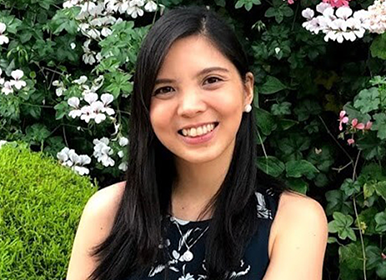
Philippines
Corinne Ablaza
The NUS MBA Class of 2020
Structured Finance Associate, NORD/LB (Singapore)
What were you doing before you joined The NUS MBA?
I worked in a large renewable energy firm in the Philippines called the Energy Development Corporation (EDC) for over five years. I started in business development, but later found myself assuming various roles across the operational side of the business including commercial and financial analysis, risk and cost management, and strategic planning.
What was your career goal before you joined The NUS MBA? Did it change during or after completing the programme?
I initially entered the programme wanting to break into strategic consulting. However, this changed when I started looking for internships. The entire application and job hunting process, together with my activities at school and encounters with mentors and alumni, helped me to assess my skill set as well as my long-term career goals. I realised energy and sustainability were growing industries globally and I still wanted to be involved in them, but at the same time, I wanted to spend the next few years developing new skills in a completely different space. I found my “perfect match” when I came across an opportunity for a 6-month project finance internship for renewable energy investments.

What did you do during the programme to achieve your goal?
I knew that if I wanted to make the most of my NUS MBA experience, I had to go beyond classroom learning. I joined the student council as vice president, which allowed me to participate in all the different club activities and gain a deeper understanding of topics I never thought I would come across. I also participated in a number of MBA competitions where I experienced what it was like to be a start-up founder, venture capitalist, and a consultant. Through my immersion trips to London and Paris, I was able to increase my exposure to different companies and expand my network across the globe. I also attended many networking events hosted by the career services office and alumni which served as a great and honest way to hear about real-life experiences and get advice from people who have been in your shoes before.
It was a combination of all of these experiences which helped me to narrow down what I really wanted to do and led me to an internship in finance. I didn’t have the background for it, nor did I even specialise in it during my MBA, but I believe I was able to show a wide spectrum of skills and experiences which were a fit to what the role needed.
How long did it take to achieve your post-MBA goal?
I’d say it didn’t take me too long since I landed my internship during my second semester, but I had to sacrifice some things for it. I came into the MBA wanting to do a long-term exchange during my third semester, but decided to give this up so I can instead pursue a long-term internship. It was a tough choice, but I didn’t know if I would ever come across this opportunity again and I decided it was more important for me to make this career and geographical switch.
Thankfully, I was able to convert my 6-month internship immediately after it ended into a full time position. I am now working as an associate in the structured finance origination team of NORD/LB in its regional office in Singapore, handling renewable energy and infrastructure investments across Asia Pacific.

What’s your advice for students who are looking for a career or geographical switch?
- Don’t give up. It may seem very difficult at first and it is likely you’ll encounter some challenges along the way, but it is possible to do a career and geographical switch at the same time. The more people you talk to, the more activities you involve yourself in, and the more job applications you send out, the more chances you have of making that switch.
- Don’t be intimidated by the job description just because you don’t have any previous experience in that area. It starts with knowing yourself first and what you can contribute to the table, then finding a way to tailor your job application so you can use whatever previous skills or experiences you have to prove you’re a good fit to the new role. Always show willingness to learn because recruiters will likely hire you for your potential and not for your hard skills.
To learn more about The NUS MBA experience, download a brochure, or attend an event.